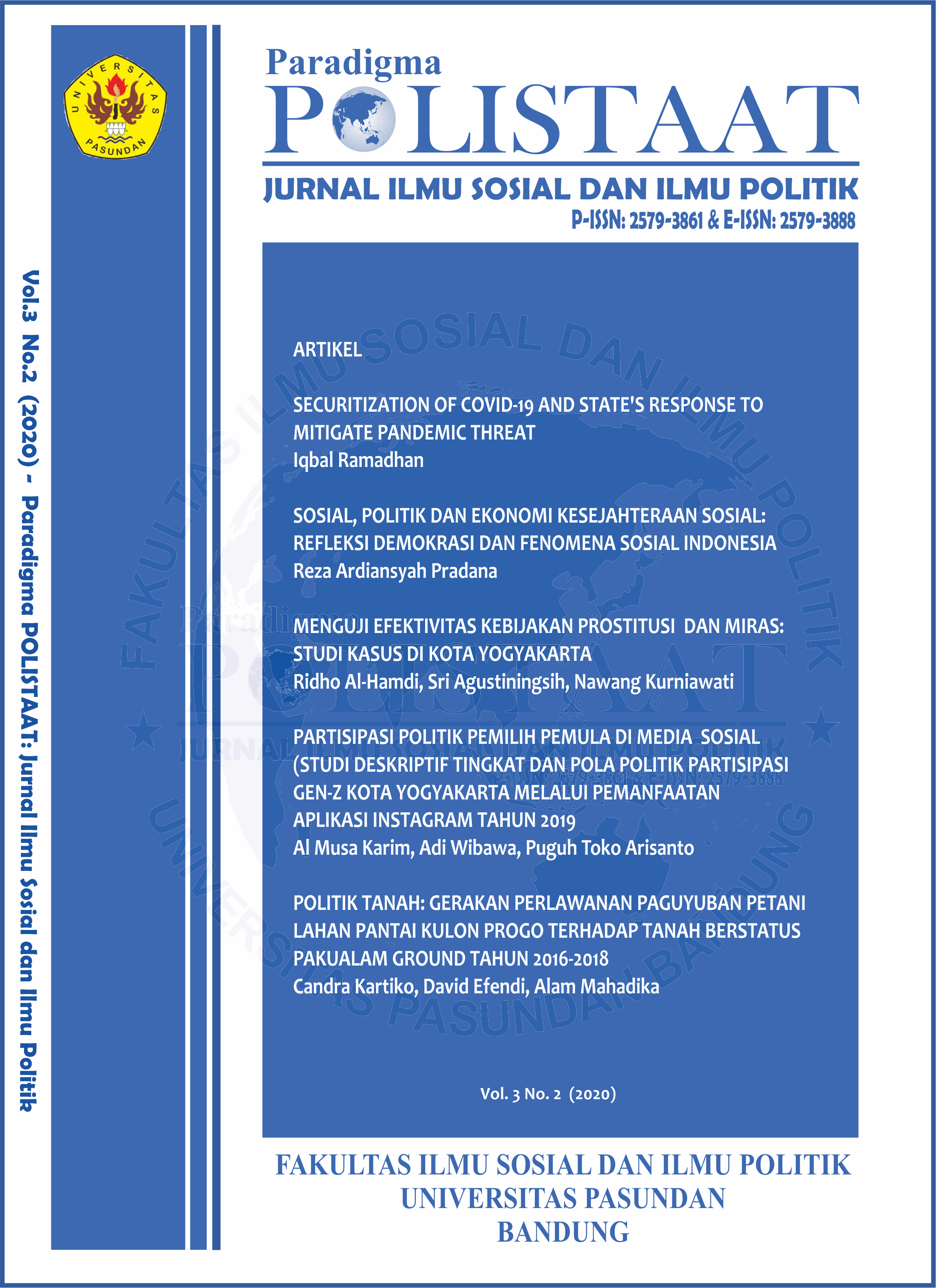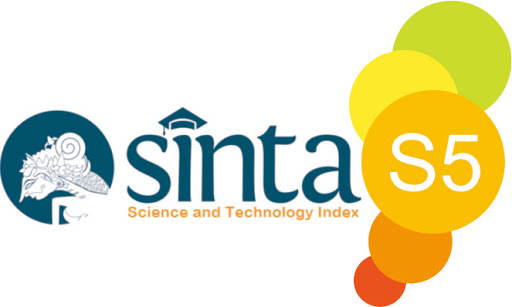SOSIAL, POLITIK, DAN EKONOMI KESEJAHTERAAN SOSIAL: REFLEKSI DEMOKRASI DAN FENOMENA SOSIAL INDONESIA
DOI:
https://doi.org/10.23969/paradigmapolistaat.v3i2.3717Keywords:
Anthropology-Sociology, Social Policy, Public Policy, Social Welfare, Welfare State, and Democracy.Abstract
In an effort to understand social welfare, a multidimensional framework from a social, political and economic perspective is needed. The social perspective will show how society on an individual and community basis is an important part of social welfare studies. With sociological approaches such as Max Weber and Pierre Bourdieu in the analysis of society and even politics, this paper shows that anthropology in seeing the phenomenon of welfare is not quite right. Then in the realm of politics, this paper seeks to present the side of public policy and social policy resulting from the political process and how democracy works in its transition and circumstances. The economy is seen from both global and local perspectives as a reality of the world phenomena that have occurred regarding the 1997 and 2008 recessions, then the neoliberalism regime, and then how the alternative welfare proposed by some thinkers is presented in this paper.
Downloads
References
Acemoglu, D., & Robinson, J. (2012). Why Nations Fail: The Origins of Power, Prosperity, and Poverty. Redfern: Currency.
Acemoglu, D., & Robinson, J. (2019). The Narrow Corridor: States, Societies, and the Fate of Liberty. New York: Penguin.
Alpaster, C. (2006). “The East Asian Welfare Model”, International Journal of Social Welfare, 15(4), pp. 290-301.
Arrow, K. J. (1999). “Amartya K. Sens’s Contributions to the Study of Social Welfare”, The Scandinavian Jurnal of Economics, 101(2), pp. 162-172.
Bourdieu, P. (1992). Language and Symbolic Power. Massachusetts: Harvard University Press.
Croissant, A. (2004). “Changing Welfare Regimes in East and Southeast Asia: Crisis. Change, and Challenge”, Social Policy & Administration, 38(5), pp. 504-524.
Deacon, B. (2013). Global Social Policy in the Making: The Foundations of the Social Protection Floor. Bristol: Policy Press.
DiNitto, D. M., & Johnson, D. H. (2016). 8th Edition. Social Welfare: Politics and Public Policy. New York: Pearson.
DuBois, B., & Miley, K. K. (2005). 5th Edition. Social Work: An Empowering Profession. Boston: Allyn & Bacon.
Gough, I., Wood, G., Barrientos, A., Bevan, P., Davis, P., & Room, G. (2004). Insecurity and Welfare Regimes in Asia, Africa, and Latin America. Oxford: Oxford University Press.
Greve, B. Ed. (2019). 2nd Edition. Routledge Handbook of the Welfare State. London: Routledge.
Habermas, J. (1975). Legitimation Crisis. Boston: Beacon Press.
Habermas, J. (1987). Volume II. The Theory of Communicative Action Lifeworld and System: A Critique of Functionalist Reason. New Jersey: John Wiley & Sons.
Habermas, J. (1992). The Structural Transformation of Public Sphere. Massachusetts: MIT Press.
Hadiz, V. (2003). “Reorganizing political power in Indonesia: A reconsideration of so-called democratic transitions”, The Pacific Review, 16(4), pp. 591-611.
Held, D. (1980). Introduction to Critical Theory: Horkheimer to Habermas. California: University of California Press.
Holiday, I. (2000). “Productivist welfare capitalism: social policy in East Asia”, Political Studies, 48(4), pp. 706-723.
Holiday, I., & Wilding, P. (2003). Welfare Capitalism in East Asia: Social Policy in the Tiger Economies. New York: Palgrave Macmillan.
Kaasch, A. (2015). Shaping Global Health Policy: Global Social Policy, Actors, and Ideas about Health Care Systems. New York: Palgrave Macmillan.
Kaasch, A., & Martens, K. Eds. (2015). Actors and Agency in Global Social Governance. Oxford: Oxford University Press.
Karger, H. J., & Stoesz D. (2018). 8th Edition. American Social Welfare Policy: A Pluralist Approach. New York: Pearson.
Kenneth, P. Ed. (2013). 2nd Edition. A Handbook of Comparative Social Policy. Cheltenham: Edward Elgar Publishing.
Kȕhner, S. (2015). “The productive and protective dimensions of welfare in the Asia-Pacific: Pathways toward human development and income equality?”, Journal of International and Comparative Social Policy, 31(2), pp. 51-73.
Kwon, H. (2005). “Transforming the developmental welfare state in East Asia”, Development and Change, 36(3), pp. 77-97.
Lin, K., & Wong, C. K. (2013). “Social policy and social order in East-Asia: on evolutionary view”, Asia Pacific Journal of Social Work and Development, 23(4), pp. 70-84.
Manza, J., & Sauder, M. (2009). Inequality and Society: Social Science Perspective on Social Stratification. New York: W. W. Norton.
Midgley, J., Surender, R., & Alfers, L. Eds. (2019). Handbook of Social Policy and Development. Cheltenham: Edward Elgar Publishing.
Nie, N., Junn, J., & Stehlik-Barry, K. (1996). Education and Democratic Citizenship in America. Chicago: University of Chicago Press.
Ocampo, J. A., & Stiglitz, J. Eds. (2018). The Welfare State Revisited. New York: Columbia University Press.
Pierson, P. (2001). The New Politics of the Welfare State. Oxford: Oxford University Press.
Rodan, G., & Jayasuriya, K. (2009). “Capitalist development, regime transitions, and new forms of authoritarianism in Asia”, The Pacific Review, 22(1), pp. 23-47.
Schattscneider, (1935). Politics, Pressure, and the Tariff. New York: Prantice-Hall.
Sen, A. (1985). Commodities and Capabilities. Oxford: Oxford University Press.
Sen, A. (1999). Development as Freedom. Oxford: Oxford University Press.
Sen, A. (2002). “Responses to commentaries”, Studies in Comparative International Development, 37(2), pp. 78-86.
Sen, A., & Nussbaum, M. Eds. (1993). The Quality of Life. Oxford: Oxford University Press.
Shore, J. (2019). The Welfare State and the Democratic Citizen: How Social Policies Shape Political Equality. New York: Palgrave Macmillan.
Stiglitz, J. (2002). Globalization and its Discontent. New York: W.W Norton.
Stiglitz, J. (2012). The Price of Inequality. London: W. W. Norton.
Stiglitz, J. (2015). “Inequality and Economic Growth”, The Political Quarterly, 86, pp. 134-155.
Suharto, E. (2008). Kebijakan Sosial sebagai Kebijakan Publik. Bandung: Alfabeta.
Suharto, E. (2009). Kemiskinan dan Perlindungan Sosial. Bandung: Alfabeta.
Sumarto, M. (2013). “Welfare Regime, Social Conflict, and Clientism in Indonesia”, PhD Thesis. Australian National University.
Sumarto, M. (2014). Perlindungan Sosial dan Klientelisme: Makna Bantuan Tunai dalam Pemilihan Umum. Yogyakarta: Gadjah Mada University Press.
Sumarto, M. (2017). “Welfare Regime Change in Developing Countries: Evidence from Indonesia: Social Policy & Administration, 51(6), pp. 940-959.
Taylor-Gooby, P. (1991). “Welfare State Regimes and Welfare Citizenship”, Journal of European Social Policy, 1(2), pp. 93-105.
Tweedy, J., & Hunt, A. (1994). “The Future of the Welfare State and Social Rights: Reflection on Habermas”, Journal of Law and Society, 21(3), pp. 288-316.
Wilkinson, R., & Pickett, K. (2010). The Spirit Level: Why Greater Equality Makes Societies Stronger. New York: Bloomsbury Press.
Wood, G., & Gough, I. (2006). “A comparative welfare refime approach to global policy”, World Development Journal, 34(10), pp. 692-712.
Yi, I. Ed. (2017). Towards Universal Health Care in Emerging Economies: Oppurtunities and Challenges. New York: Palgrave Macmillan.
Yuda, T. K. (2018). “Welfare regime and the patrimonial state in contemporary Asia: visitng Indonesian cases”, Journal of Asian Public Policy, 12(3), pp. 351-365.
Yuda, T. K. (2018). “Welfare Regime Transformation in Indonesia: A Citizenship Debate”, MASYARAKAT Jurnal Sosiologi, 23(2), pp. 143-165.
Downloads
Published
Issue
Section
License

Paradikma Polistaat: Jurnal Ilmu Sosial dan Ilmu politik is licensed under a Creative Commons Attribution-ShareAlike 4.0 International License
In order to be accepted and published by Paradigma POLISTAAT: Jurnal Ilmu Sosial dan Ilmu politik, author(s) submitting the article manuscript should complete all the review stages. By submitting the manuscript the author(s) agreed to these following terms:
1. The copyright of received articles shall be assigned to Paradigma POLISTAAT: Jurnal Ilmu Sosial dan Ilmu politikas the publisher of the journal. The intended copyright includes the right to publish articles in various forms (including reprints). Paradigma POLISTAAT: Jurnal Ilmu Sosial dan Ilmu politikmaintain the publishing rights to the published articles.
2. Authors are permitted to disseminate published article by sharing the link/DOI of the article at Paradigma POLISTAAT: Jurnal Ilmu Sosial dan Ilmu politik. authors are allowed to use their articles for any legal purposes deemed necessary without written permission fromParadigma POLISTAAT: Jurnal Ilmu Sosial dan Ilmu politik with an acknowledgement of initial publication to this journal.
3. Users/public use of this website will be licensed to CC BY-SA (Attribution & ShareAlike).















